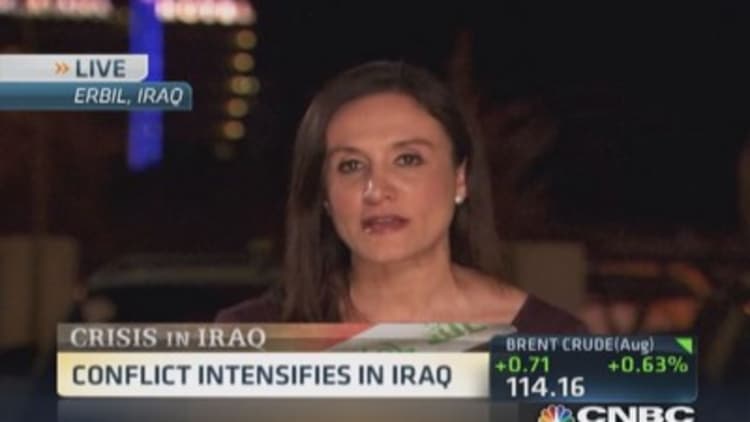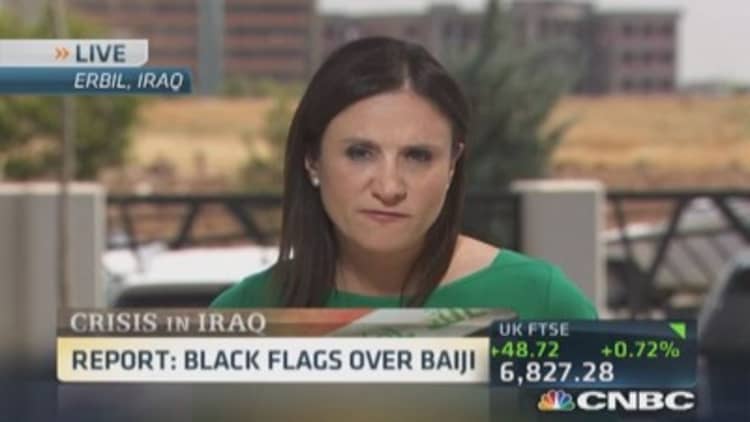As radical Sunni militants violently wrest away control of much of Iraq, the country's ultimate fate is still open to debate. What are the worst- and best-case scenarios? CNBC turned to several experts from the United States, Middle East and elsewhere for their thoughts.
Worst-case scenario: 'This is going to burn'
For Rick Brennan, a senior political scientist at RAND Corp. and former senior civilian adviser to the U.S. forces in Iraq, the worst possible outcome is the total disintegration of the country.
That, he said, would occur if Sunni militias—currently led by the Islamic State in Iraq and Syria (ISIS)—successfully conducts "spectacular terrorist attacks" that unleash a sectarian bloodbath. Ethnic cleansing would follow, with Shiites in Baghdad and southern Iraq turning on their Sunni neighbors.
Eventually what would happen, Brennan said, is a tense three-state stalemate with the Shiites in the south and east, the Kurds in the north, and a Sunni caliphate from western Iraq to Syria that would "make what we had in Afghanistan pre-9/11 pale in comparison." In this scenario, Brennan said, the Shiite territory becomes so dependent on Iran for safety, that it is "nothing more than a client state of Tehran."
Read MoreWe're seeing the end of Iraq—here's an American gameplan
Kirk Sowell, a political risk analyst who publishes the Inside Iraqi Politics newsletter, predicted a similar worst-case outcome. Any Sunni state resulting from a three-way stalemate would be a "catastrophic mess," he said.
For some, the worst conceivable scenario is also the one they see as most probable. Kenneth Pollack, a senior fellow at the Brookings Institution and a former Iraq military analyst for the CIA, said he expects hundreds of thousands of Iraqi deaths over a years-long conflict.
"This is going to burn for a long time," he said.
Experts agreed that international involvement in Iraq could only be a bad thing. Ted Carpenter, a Cato Institute senior fellow, said his worst-case outcome in Iraq involves the United States being dragged back into the "bloody, convoluted rivalries" of the country.
Read More
Pollack, meanwhile, said he views external actors as promoting perpetually violent stalemates—they offer just enough assistance so their proxy cannot lose, but they will rarely provide sufficient support for a victory. Other countries, like Saudi Arabia, are content to quietly funnel aid to insurgents who are harming the interests of oil-producing rivals, according to Reva Bhalla, vice president of Global Analysis for geopolitical intelligence firm Stratfor.
Best-case scenario: 'reconciliation'
The political buzzword for an ideal outcome is "reconciliation," but even the most optimistic experts told CNBC that this seems unlikely in the near term and perhaps beyond.
Were Iraq's factions to come back together, a healing of wounds between the Sunni and Shiite populations of Iraq would require ISIS to fall from its current position of power. That could happen in several ways: RAND's Brennan said he could conceive of the militant group overplaying its role as leader of Sunni forces, and thus losing control to a moderate nationalist leader.

Another way ISIS could lose power over its Sunni allies would be if native Sunni tribes began to feel they could win sufficient concessions from Baghdad, Bhalla said. In fact, she added, these groups would happily cast off the militant group if they felt like the Shiite-led government was willing to give them enough.
Read MoreExxon staff exit Iraq amid spiraling violence
"It's not like the indigenous Sunnis of Iraq are comfortable with ISIS coming through and calling the shots," Bhalla said. "They want leverage. … Now the focus is how do you get these guys to the table?"
Any conciliatory coalition would require a moderate response from the current government in Baghdad. Pollack said he cannot imagine that happening, because the government of Prime Minister Nouri al-Maliki "seems to have no interest," and his support system in Tehran is not sufficiently willing to produce such a peace.
Likely scenario: 'sectarian cleansing'
A clear majority of the experts interviewed for this article said they expect to see Iraq transform into some sort of three-way region, although they differed on how long the current situation will persist, and just how bloody it would be.
The most likely scenario "is one in which there is a long and bloody fight, the Sunni insurgency is defeated, Sunnis suffer sectarian cleansing in Baghdad and Diyala, but Sunni provinces ultimately reconcile after suffering economic collapse," Sowell said. "That's a pretty bad scenario, but it is the most likely one."

Opinions varied widely on the fate of the —relatively pro-Western people spread over a region that includes northern Iraq, Syria and Turkey. The Kurds have struggled for independence for centuries but never achieved it, although Kurdish-dominated northern Iraq became autonomous following the fall of Saddam Hussein.
Brennan said he could see an independent Kurdistan rising in the north. And, perhaps most surprisingly, he can see this new state receiving support from the Turkish government because it would at least be a stable, oil-producing neighbor.
Read MoreViews from Kurdistan: Iraqi refugees flee fighting
Bhalla disagreed. The Kurds, she said, would probably not be successful in declaring independence any time soon—precisely because of Turkey.
"The Turks are not going to be comfortable with an independent Kurdistan—that imperative does not change," she said.
As for Iraq's southern reaches, most experts agreed that it would become an increasingly Shiite region, as militias turn on their Sunni neighbors. Although such events may give Shiite Iran greater influence, the Iraqi Shiites will not be completely under Iran's thumb, Bhalla said, as both their Arab roots and their fractious nature will prove difficult for Persian Iran to manage.
Effects on oil
The other major concern for the south is its oil production. Olivier Jakob, managing director for Swiss-based oil consultancy Petromatrix, told CNBC he expects the region's exports to remain stable, but to fall short of growth projections for the next few months.
If current turmoil persists, however, it could significantly reshape existing energy market predictions: The International Energy Agency expected Iraqi oil production to almost double to 6 million barrels per day in 2020, from 3.3 million in 2014, according to the nonpartisan Securing America's Future Energy organization.
Read MoreMilitants attack Iraq refinery; 40 workers kidnapped
Although it is unlikely to collapse, oil production in southern Iraq may decrease, Pollack said, citing three reasons:
First, ISIS will continue to conduct terrorist operations aimed at the Baghdad-controlled energy infrastructure to hurt its revenue stream. Second, the inefficiencies that oil companies currently complain about in the Iraqi government will only worsen as its leaders focus on war instead of permits and bureaucracy. And finally, Pollack said, the security situation will deteriorate in southern Iraq as the military heads to the front, and local tribes and organized crime fight for control over the oil-producing regions.
All of those problems, Pollack said, will force oil companies to spend more money on keeping their facilities and personnel safe, and they may soon find these costs outweighing the benefit of continued operation.
Iraqi collapse 'was foreseeable'
Brennan recalled how in late 2011, as U.S. troops concluded their withdrawal from Iraq, he sat in as part of a group of senior American military planners who were informally discussing their nightmare scenario for Iraq.
"We're seeing that (scenario) right now," he said. "We knew the (Iraqi) military could not stand on its own—this was something which was foreseeable, but it was something that nobody wanted to talk about."
—By CNBC's Everett Rosenfeld and Yousef Gamal El-Din contributed reporting.


